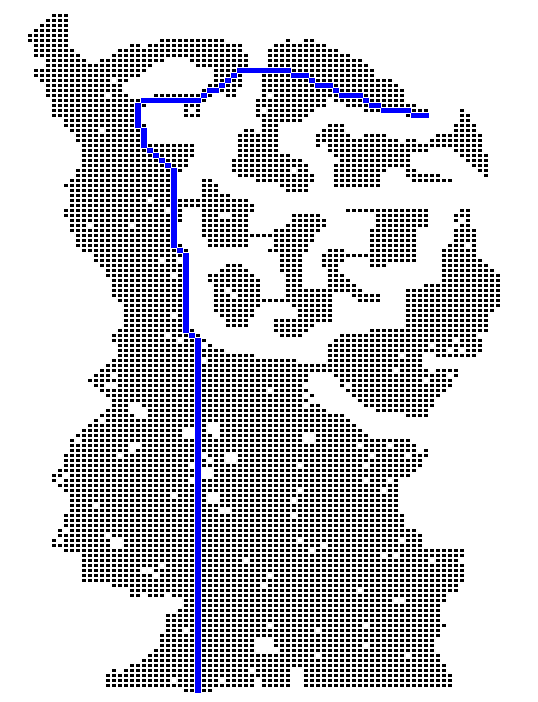
Pathfinding using Rank-Pairing Heaps
Jul 31, 2023
3 min read
Rank pairing heaps
Introduction
This is a header-only implementation of rank-pairing heaps (rp-heap) written in C++11. The idea of rp-heap is based on lazy binomial queue with the rank restriction to ensure the balance of half trees. Heap has wide applications like heapsort, k-smallest elements, Prim's algorithm and notably well-known Dijkstra's shortest-path algorithm. We are implementing this data structure because:
- std::priority_queue does not support decrease-key
- Fibonacci heap is theoretically fast but not good in practice
- we are looking for an efficient 'decrease key' operation in pathfinding algorithm which is better than practical d-ary heap and pairing heap
In game development, A* algorithm is a standard shortest path algorithm. The main file provides a demo of A* pathfinding using rp-heap.
Usage
The implementation mimics STL containers and provides STL-like member functions.
To use it, simply include the header file
rp_heap.h
Basic member functions
cpp// make heaprp_heap(const _Pr& _Pred = _Pr());// capacitybool empty() const;size_type size() const;// find-minconst_reference top() const;// insert, returns an iterator holding the internal pointer of node for the parameter of decrease keyconst_iterator push(const value_type& _Val);const_iterator push(value_type&& x);// delete-minvoid pop();void pop(value_type& _Val);// delete-allvoid clear();// decrease-keyvoid decrease(const_iterator _It, const value_type& _Val);// for type 1 rank reduction (default type 2)#define TYPE1_RANK_REDUCTION
Test program
cpp#include <iostream>#include <algorithm> // std::random_shuffle#include "rp_heap.h"#include <vector>int main(){ std::vector<int> v; int size = 1000; for (int i = 0; i < size; i++) v.push_back(i + 1); // v = {1, 2,... 1000} std::random_shuffle(v.begin(), v.end()); // shuffle v rp_heap<int> heap; std::vector<rp_heap<int>::const_iterator> its; // save the iterators returned from push for (int i = 0; i < size; i++) its.push_back(heap.push(v[i])); heap.decrease(its[0], 0); // a number decreases to 0 heap.pop(); // pop that number for (int i = 1; i < size; i++) heap.decrease(its[i], *its[i] - 1); // each element in heap is decreasd by 1 while (!heap.empty()) { int x; heap.pop(x); std::cout << x << '\n'; // will print the number from {1, 2,...999} but missing the one in the first pop } return 0;}
Performance
| Operations | Amortized time |
|---|---|
| find-min | O(1) |
| delete-min | O(log n) |
| insert | O(1) |
| decrease-key | O(1) |
| size | O(1) |
| delete-all | O(n) |
- For detailed analysis of rp-heap, see [1]
A* algorithm using rp-heap
A sample map taking from MMORPG Strugarden NEO

Transformed 2D grid Map

Shortest path by BFS (unweighted, 4-direction movement)

Shortest path by A* (weighted, 8-direction movement)

References
[1] B. Haeupler, S. Sen, and R. E. Tarjan. Rank-pairing heaps. SIAM J. Comput., 40:1463–1485, 2011.
[2] Cherkassky, Boris V.; Goldberg, Andrew V.; Radzik, Tomasz (1996), "Shortest paths algorithms: theory and experimental evaluation", Mathematical Programming, Series A 73 (2): 129–174, doi:10.1016/0025-5610(95)00021-6, MR 1392160
